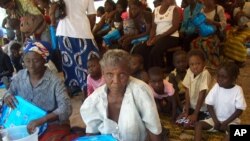African health experts and officials have hailed the Chinese drug Artemisinin that they say is playing a key role in combating malaria on the continent.
The continent has Nobel Prize winner Chinese scientist, Tu Youyou, to thank for the drug that has been saving lives in many countries, including Zimbabwe where an official survey recently revealed Artemisinin's cure rate against malaria was as high as 97 percent.
Tu won a share of the 2015 Nobel Prize on Physiology or Medicine "for her discoveries concerning a novel therapy against malaria."
The other half of the Nobel Prize went to Japanese microbiologist Satoshi Omura and William Campbell, an Irish-born U.S. scientist, who created the drug avermectin.
Health officials attending the 2nd Ministerial Forum on Africa-China Health Development in South Africa said Artemisinin, used in combination with other factors like the use of insecticide-treated mosquito nets, has reduced the mortality rate in Africa.
"This drug has made such a tremendous difference to global health really,” said Dr. Tshedi Moeti, the World Health Organization’s (WHO) Regional Director for Africa.
“We particularly appreciate it in the African region as you know malaria is one of the biggest killer of African people, particularly African children. And we were discussing the malaria development goals last week in the New York in the UN General Assembly, it was acknowledged that the African countries have made tremendous progress in reducing child death,” said Dr. Moeti.
Zimbabwe
Artemisinin, which was inspired by traditional Chinese medicine, is now a top treatment for malaria, and has worked effectively in Zimbabwe, where it has won the praise of experts and ordinary people who have suffered with malaria for years.
Zimbabwe started promoting the medicine in 2008, a result of years of research under a project that once involved 500 scientists in China.
According to a survey conducted by Zimbabwe's health ministry, Artemisinin's cure rate against malaria is as high as 97%.
Boniface Chimwendo from Mudzi is Mashonaland Est province in Zimbabwe said his mother had suffered from malaria for almost 10 years.
But thanks to Artemisinin, he said she was now cured and has not been struggling with the disease since.
"The malaria disease develops some resistance like when you are given Malaquine, some people don't get cured because the disease can get some resistance. So the discovery of the new drug is very essential because it will help people cure, to help people live longer away from the Malaria diseases," said Chimwendo.
Another Harare resident, Sharon Mazingaizo also praised the drug's effectiveness.
"Last year my cousin got malaria, and we took him to the local clinic. They gave him some drugs. They gave him Artemisinin. And it was a very good drug. He took it for almost a week and then he was okay. I think the drug is very good here in Africa," said Mazingaizo.
According to Tan Yijing, head of the Chinese medical team now working in Zimbabwe, Artemisinin has played an important role in eradicating malaria in the country.
"Before Artemisinin was introduced to the country, they used quinine. Now according to their statistics, Artemisinin has worked very effectively since it was applied here, and it has few side effects. The medicine has won prevalent recognition of both local medics and patients," said Tan.
Comoros
Comoros is another African country that has benefited from the drug. The nation launched a malaria control program in 2007, and just three months later, the infection rate of the disease had dropped by 98.7%.
In 2004, Comoros reported zero death rate of malaria patients.
"Comoros and China’s cooperation has made great achievements in the health sector, especially in the anti-malaria program. It is a big success not only for the Chinese scientist who won the Nobel Prize, but also for the people of Comoros,” said Fouad Mohadji, Vice President of Comoros.
Following successes in Zimbabwe and the Comoros, Malawi is now promoting the anti-malarial program. Over 60% of its population suffered from the disease.
"If you can remove, if you can get rid of malaria that means we can free 60 percent of budget. So that is a good relationship that we have with china in health sector," said Dr. Peter Kumpalume, Malawi’s Minister of Health.
The drug is also being used widely in Angola where officials said it had saved the lives of thousands.
According to the World Health Organization, around 430,000 people die from malaria each year in the world and 90% of the deaths are in Africa, with young children under the age of 5 being the worst affected.








